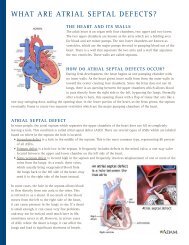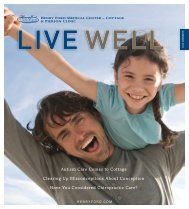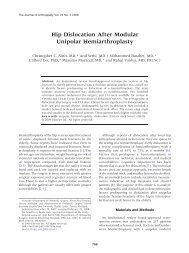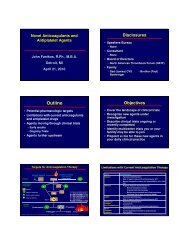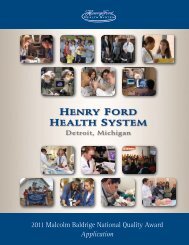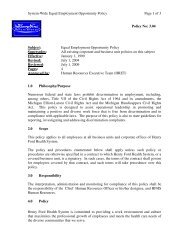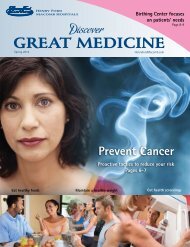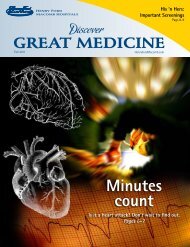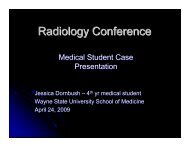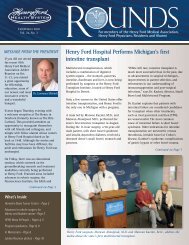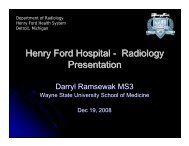Winter 2012 - Henry Ford Health System
Winter 2012 - Henry Ford Health System
Winter 2012 - Henry Ford Health System
You also want an ePaper? Increase the reach of your titles
YUMPU automatically turns print PDFs into web optimized ePapers that Google loves.
<strong>Winter</strong> <strong>2012</strong><br />
Vol. 26, No. 1<br />
For members of the <strong>Henry</strong> <strong>Ford</strong> Medical Association,<br />
<strong>Henry</strong> <strong>Ford</strong> Physicians, Residents and Alumni<br />
Message from the President<br />
Since the doors<br />
opened at <strong>Henry</strong><br />
<strong>Ford</strong> Hospital in<br />
1915, the flagship<br />
hospital has been<br />
an academic center<br />
for education and<br />
research. <strong>Henry</strong><br />
<strong>Ford</strong> is one of the<br />
nation’s largest Lawrence Mitchell, M.D.<br />
non-universitybased<br />
research<br />
centers, receiving more than $50 million<br />
in funding annually from the National<br />
Institutes of <strong>Health</strong> and other sources.<br />
Additionally, as one of the largest medical<br />
education teaching centers in the nation,<br />
<strong>Henry</strong> <strong>Ford</strong> trains more than 1,600<br />
doctors every year. This commitment<br />
to research and education has earned<br />
<strong>Henry</strong> <strong>Ford</strong> Hospital and <strong>Henry</strong> <strong>Ford</strong><br />
Medical Group a national reputation<br />
for excellence. (Read more about <strong>Henry</strong><br />
<strong>Ford</strong>’s Medical Education program on<br />
Page 2.)<br />
Philanthropic support is instrumental<br />
to our ability to stay at the forefront<br />
of medical education and advanced<br />
technology. Through an endowment<br />
fund, the <strong>Henry</strong> <strong>Ford</strong> Medical Association<br />
supports various medical education<br />
endeavors, including the Frank J. Sladen<br />
Library, which serves the information<br />
What’s Inside<br />
Continued on Page 5<br />
Medical Education at <strong>Henry</strong> <strong>Ford</strong> - Page 2<br />
Transradial Cardiac Catheterization - Page 3<br />
In Memoriam – Page 4<br />
HFMG People – Page 5<br />
Innovation Institute - Page 6<br />
HFHS receives Baldrige Award – Page 6<br />
Alumni Notes - Page 8<br />
At every stage – The newly expanded<br />
Women’s <strong>Health</strong> Services<br />
<strong>Henry</strong> <strong>Ford</strong> Department of Women’s<br />
<strong>Health</strong> Services has always had a strong<br />
history of providing high-quality, patientcentered<br />
care designed especially to<br />
meet women’s needs, from puberty to<br />
menopause and beyond.<br />
In recent years, as part of <strong>Henry</strong> <strong>Ford</strong>’s<br />
commitment to provide comprehensive<br />
women’s health services and the most<br />
advanced care, the department has<br />
undergone a major transformation<br />
– expanding to better serve the<br />
community’s needs. This has made it one<br />
of the area’s largest programs.<br />
The obstetrics and gynecology medical<br />
providers at <strong>Henry</strong> <strong>Ford</strong> <strong>Health</strong> <strong>System</strong><br />
offer a comprehensive range of care<br />
– from providing the latest screening<br />
exams and treating the most complex<br />
gynecological disorders to delivering<br />
more than 7,000 babies each year.<br />
“Throughout our health system, we now<br />
have a strong presence of women’s health<br />
services and a large group of excellent<br />
general obstetrics and gynecology<br />
physicians,” says Adnan Munkarah, M.D.,<br />
chair of Women’s <strong>Health</strong> at <strong>Henry</strong> <strong>Ford</strong><br />
<strong>Health</strong> <strong>System</strong>. “In addition, we have<br />
complemented this care with experts<br />
in all of the major subspecialties in<br />
obstetrics and gynecology.”<br />
Women’s <strong>Health</strong> Services has one of the<br />
larger surgical programs in the region<br />
for gynecologic oncology. Along with<br />
Dr. Munkarah, the department has three<br />
surgeons who are trained to provide the<br />
highest-quality care for women with<br />
cancers of the ovary, uterus, cervix or any<br />
other type of gynecologic malignancy.<br />
Collaboration is a key element of the<br />
department, something that is especially<br />
important when it comes to cancer<br />
Continued on Page 7<br />
The Department of Women’s <strong>Health</strong>, led by Adnan Munkarah, M.D., uses advanced<br />
imaging techniques to diagnose and treat women with gynecologic cancers.
Medical Education at <strong>Henry</strong> <strong>Ford</strong><br />
2<br />
As one of the largest medical<br />
education teaching centers in<br />
the nation, <strong>Henry</strong> <strong>Ford</strong> <strong>Health</strong><br />
<strong>System</strong> trains more than 1,600<br />
doctors every year. A Rounds<br />
editor recently sat down with Eric<br />
Scher, M.D., the outgoing director<br />
of <strong>Henry</strong> <strong>Ford</strong> Hospital’s Graduate<br />
Medical Education programs,<br />
to discuss the programs, how<br />
medical education has changed<br />
and where it is headed – as he<br />
transitions to his new role as<br />
chair of Internal Medicine for the<br />
<strong>Henry</strong> <strong>Ford</strong> Medical Group. Since<br />
2007, Dr. Scher has directed all of<br />
the medical education activities<br />
at <strong>Henry</strong> <strong>Ford</strong> Hospital, which<br />
are among the largest in the<br />
nation. He also was responsible<br />
for the education programs in the<br />
suburban hospitals, which together<br />
comprise the largest osteopathic<br />
educational enterprise in the<br />
country. Dr. Scher will continue<br />
in his role as vice president of<br />
Medical Education for <strong>Henry</strong> <strong>Ford</strong><br />
<strong>Health</strong> <strong>System</strong>.<br />
Rounds: What lessons have<br />
you learned during your time<br />
overseeing medical education at<br />
<strong>Henry</strong> <strong>Ford</strong>?<br />
Dr. Scher: I’ve had a long history<br />
with education at <strong>Henry</strong> <strong>Ford</strong><br />
Hospital, beginning with my own<br />
undergraduate medical education<br />
in 1982. What I’ve learned over<br />
the years is that trainees are an<br />
integral part of our health care<br />
workforce. Training the physicians<br />
of the future is a rewarding<br />
endeavor, and creating a climate of<br />
inquiry is one of the best ways for<br />
an institution to stay on the cutting<br />
edge. Our trainees are a valuable<br />
resource and we couldn’t do what<br />
we do without them.<br />
Rounds: How has medical<br />
education changed in the U.S. and<br />
where do you see it going?<br />
Dr. Scher: The system as a whole<br />
has become more process- and<br />
outcome-oriented. Accreditation<br />
agencies, government and society<br />
in general have come to expect<br />
more from the medical education<br />
community. Regulations and<br />
curricular requirements have<br />
become much more burdensome,<br />
something that is likely to<br />
continue. It can be overwhelming<br />
for trainees as well as educators,<br />
and we worry these hassles may<br />
outweigh the reward for some –<br />
which in turn could threaten the<br />
quality of the training.<br />
Personal priorities have also<br />
evolved over time. Students today<br />
are much more interested in worklife<br />
balance and less willing to<br />
work the long hours traditionally<br />
associated with training.<br />
I believe that medical education is<br />
evolving into a competency-based<br />
system and students and residents<br />
will be judged more on training<br />
milestones than time-based factors.<br />
We will see more of a focus on the<br />
individual rather than the program.<br />
So it’s a question of dealing<br />
with these challenges, meeting<br />
expectations and helping students,<br />
residents and society understand<br />
that medicine is a calling that<br />
requires rigorous training and selfsacrifice.<br />
Rounds: How does <strong>Henry</strong> <strong>Ford</strong>’s<br />
program stand up against our<br />
competitors?<br />
Dr. Scher: If you look at quality<br />
metrics, <strong>Henry</strong> <strong>Ford</strong> stands up very<br />
well. The quality of our applicants<br />
is very high, as is the quality of<br />
the 46 residency and fellowship<br />
programs sponsored by <strong>Henry</strong> <strong>Ford</strong><br />
Hospital. We have more than 600<br />
medical students, 500 residents<br />
and 150 fellows each year,<br />
and when you count our allied<br />
health programs, we have several<br />
thousand learners at any one time.<br />
Eric Scher, M.D.<br />
Rounds: What is the relationship<br />
between <strong>Henry</strong> <strong>Ford</strong> Hospital and<br />
Wayne State University Medical<br />
School?<br />
Dr. Scher: It’s a strong<br />
relationship. We have been<br />
working with Wayne State for<br />
about three and a half years,<br />
and one-third of their students<br />
are trained at <strong>Henry</strong> <strong>Ford</strong>. We<br />
work together on curriculum<br />
development for their medical<br />
students, and we collaborate<br />
together on research. I think<br />
it’s important that <strong>Henry</strong> <strong>Ford</strong> is<br />
viewed as a university-affiliated<br />
institution. This will be our legacy<br />
for the next 100 years, and this<br />
relationship will allow us to go to<br />
the next level.<br />
Rounds: What will you miss<br />
most about running the medical<br />
education programs?<br />
Dr. Scher: I’ll definitely miss the<br />
operational, hands-on part of this<br />
and the close interaction with my<br />
colleagues. Medical education will<br />
always be my first love. ●<br />
For more information about<br />
medical education at <strong>Henry</strong> <strong>Ford</strong>,<br />
visit henryford.com/MedEd
Transradial cardiac catheterization technique<br />
shortens recovery time<br />
Interventional cardiologists at <strong>Henry</strong><br />
<strong>Ford</strong> Hospital are using a new<br />
technique for performing cardiac<br />
catheterization that causes less<br />
bleeding and shortens the recovery<br />
time for patients than the traditional<br />
method.<br />
The technique involves using the<br />
radial artery in the wrist to gain<br />
access to the heart. Traditionally,<br />
doctors go through the patient’s<br />
femoral artery in the groin.<br />
While most U.S. doctors use the<br />
femoral artery technique, the radial<br />
artery technique is slowly gaining<br />
acceptance because of its safety and<br />
patient convenience advantages.<br />
<strong>Henry</strong> <strong>Ford</strong> is leading the way in<br />
the metro Detroit area using the<br />
technique called transradial cardiac<br />
catheterization.<br />
“It’s less invasive for patients<br />
and it’s more convenient,” says<br />
Akshay Khandelwal, M.D., an<br />
interventional cardiologist at <strong>Henry</strong><br />
<strong>Ford</strong> who performs 70 percent of his<br />
catheterization procedures through<br />
the wrist.<br />
Dr. Khandelwal says the technique<br />
decreases the risk of bleeding and<br />
recovery is more comfortable.<br />
Afterward, patients sit up immediately<br />
Akshay Khandelwal, M.D. (center) performing transradial cardiac<br />
catheterization at <strong>Henry</strong> <strong>Ford</strong> Hospital.<br />
and rest in an armchair, while<br />
keeping their wrist straight for a<br />
few hours. With the femoral artery,<br />
or transfemoral, technique, patients<br />
often have to lie on their back in<br />
a hospital stretcher for six to eight<br />
hours – an uncomfortable prospect<br />
for patients with back, arthritic and<br />
obesity problems. Transradial cardiac<br />
catheterizations also benefit patients<br />
with peripheral vascular disease or<br />
those with a higher risk of bleeding.<br />
Patients usually go home the same<br />
day and can return to normal<br />
activities within a few days.<br />
“We’ve had very good success with<br />
the transradial technique, and our<br />
patients love it. It’s safer than the<br />
traditional technique and shortens the<br />
recovery time, and that leads to lower<br />
health care costs.”<br />
Dr. Khandelwal says most procedures<br />
that are performed using the<br />
transfemoral technique also can<br />
be performed using the transradial<br />
approach. ●<br />
To refer a patient or to consult with a<br />
physician, call 1-877-434-7470.<br />
Transradial Access Training<br />
Sign up for a free, two-day training course led by Akshay<br />
Khandelwal, M.D., a <strong>Henry</strong> <strong>Ford</strong> Medical Group interventional<br />
cardiologist. Day one includes a didactic presentation and<br />
dinner at Andiamo – Detroit Riverfront. Day two offers<br />
a hands-on procedural training at <strong>Henry</strong> <strong>Ford</strong> Hospital’s<br />
Catheterization Lab. Participants will perform transradial<br />
access and cardiac catheter manipulation under the guidance<br />
of an experienced transradial operator.<br />
Course dates:<br />
Feb. 9-10, <strong>2012</strong><br />
March 8-9, <strong>2012</strong><br />
May 3-4, <strong>2012</strong><br />
For more information or to register, contact Cari Linehan at (917) 549-9288<br />
or via email at cari.linehan@terumomedical.com.<br />
3
Michael F.<br />
Boyle, III,<br />
M.D., recently<br />
retired medical<br />
director of<br />
<strong>Henry</strong> <strong>Ford</strong><br />
<strong>Health</strong> <strong>System</strong>’s<br />
Maplegrove<br />
Center, passed<br />
away Nov. 12, 2011 following<br />
a two-year battle with cancer.<br />
Dr. Boyle was a graduate of the<br />
Philadelphia College of Osteopathic<br />
Medicine, where he finished in the<br />
top 10 in his class. He subsequently<br />
completed his residency in Internal<br />
Medicine at Detroit Osteopathic &<br />
Bi-County Community Hospital,<br />
where he later served as the<br />
hospital’s chair of Internal Medicine<br />
(1973-74); vice chief of staff (1983-<br />
84); associate director of Medical<br />
Education (1984); and director<br />
of Internal Medicine’s primary<br />
care residency training program<br />
(1981-86). In 1984, Dr. Boyle was<br />
recruited to <strong>Henry</strong> <strong>Ford</strong> <strong>Health</strong><br />
<strong>System</strong>, where he served for 27<br />
years as division head and medical<br />
director of Chemical Dependency<br />
Programs at Maplegrove Center<br />
in West Bloomfield. Dr. Boyle<br />
dedicated the majority of his career<br />
to the field of addiction medicine,<br />
chairing numerous committees at<br />
<strong>Henry</strong> <strong>Ford</strong> on impaired physicians<br />
and health care professionals. He<br />
also consulted on the topic for the<br />
National Football League and the<br />
National Basketball Association,<br />
and was director of the employee<br />
assistance program for the Detroit<br />
Tigers. Year after year, he was<br />
recognized as a “Top Doc” in<br />
Addiction Medicine by HOUR<br />
Detroit magazine. Dr. Boyle was<br />
a fellow in the American College<br />
of Osteopathic Internists and the<br />
IN MEMORIAM<br />
American Society of Addiction<br />
Medicine. For 30 years, he served<br />
as clinical associate professor at<br />
Michigan State University’s College<br />
of Osteopathic Medicine. Dr. Boyle<br />
also was active in the clinical<br />
education of medical students,<br />
interns, residents and physicians’<br />
assistants. Dr. Boyle is survived by<br />
his loving wife of 44 years Gail, his<br />
three sons Patrick (Shannon), John<br />
(Angela), and Daniel (Amy), his sister<br />
Johanna Giasi, and by the tens of<br />
thousands of friends and grateful<br />
patients whose lives he touched<br />
and often quite literally saved. His<br />
colleagues in the medical profession<br />
who had the honor and pleasure to<br />
have worked with him, will continue<br />
to be inspired by his constant<br />
reminder that “patients do not care<br />
what you know, until they know that<br />
you care.”<br />
A. Andrzej<br />
(Andrew)<br />
Endelman, M.D.,<br />
a resident with<br />
the Division of<br />
Gastroenterology<br />
at <strong>Henry</strong><br />
<strong>Ford</strong> Hospital<br />
from 1976-<br />
78, passed away April 27, 2011.<br />
After leaving <strong>Henry</strong> <strong>Ford</strong>, he and<br />
his family returned to Vancouver<br />
where he opened his practice. He<br />
was appointed by the U.B.C. Faculty<br />
of Medicine as clinical instructor,<br />
and later on as assistant clinical<br />
professor and then associate clinical<br />
professor. Dr. Endelman retired from<br />
practice and teaching in 1986. He<br />
is survived by wife Kryatyna and<br />
loving daughter Kathy.<br />
John H. Hageman, M.D., a senior<br />
staff member and peripheral<br />
vascular surgery clinical fellow<br />
with the <strong>Henry</strong> <strong>Ford</strong> Division<br />
of Vascular Surgery at <strong>Henry</strong><br />
<strong>Ford</strong> Hospital from 1968-1984,<br />
passed away March 30, 2011<br />
at the age of 76. In 1984, Dr.<br />
Hageman accepted a position at<br />
Medical College of Ohio (now<br />
known as the University of Toledo<br />
College Of Medicine) as chief of<br />
Peripheral Vascular Surgery in<br />
the Department of Surgery. For<br />
the next 14 years, he held various<br />
leadership positions, including<br />
professor of Clinical Vascular<br />
Surgery and maintained many<br />
professional affiliations. In 2003,<br />
Dr. Hageman became a partner<br />
in private practice and continued<br />
to care for patients until his<br />
retirement at age 73. Dr. Hageman<br />
is survived by his wife, Dr. Patricia<br />
Donahue and his four daughters.<br />
Carl E. Shrontz, M.D., a former<br />
resident in the Department of<br />
Internal Medicine at <strong>Henry</strong> <strong>Ford</strong><br />
Hospital, passed away January<br />
23, 2010 at age 56. After leaving<br />
<strong>Henry</strong> <strong>Ford</strong>, Dr. Shrontz completed<br />
a residency in neurosurgery in<br />
1985 and joined the neurosurgical<br />
practice of Refes, Star, Faulk and<br />
Kubala in Beaumont, Texas. He is<br />
survived by his wife Laurel Barron,<br />
and his daughters.<br />
A memorial donation is a special way to remember a friend or colleague. Making a memorial gift in their<br />
honor can be a wonderful tribute to their life, and may be designated to a specific department or program at<br />
<strong>Henry</strong> <strong>Ford</strong>. For more information, call (313) 876-1031 or visit henryford.com/giving<br />
4
HFMG<br />
PEOPLE<br />
Message from the President<br />
(Continued from Front Page)<br />
Manuel Brown, M.D., chair of<br />
the <strong>Henry</strong> <strong>Ford</strong> Department of<br />
Radiology, was recently elected<br />
president of the American College of<br />
Radiology.<br />
Jan Rival, M.D., staff physician<br />
in the <strong>Henry</strong> <strong>Ford</strong> Department of<br />
Internal Medicine, was recently<br />
honored with a Professional<br />
Achievement Award from the<br />
Wayne County Medical Society of<br />
Southeast Michigan. Dr. Rival is a<br />
Master of the American College of<br />
Physicians and past governor of the<br />
Michigan Chapter. He also served<br />
as past president of the <strong>Henry</strong> <strong>Ford</strong><br />
Medical Association.<br />
Emanuel P. Rivers, M.D., M.P.H.,<br />
vice chairman and research director,<br />
Department of Emergency Medicine,<br />
and attending staff, Emergency<br />
Medicine and Surgical Critical<br />
Care, <strong>Henry</strong> <strong>Ford</strong> Hospital, has<br />
been selected as the recipient of the<br />
Society of Critical Care Medicine’s<br />
<strong>2012</strong> Barry A. Shapiro Memorial<br />
Award for Excellence in Critical<br />
Care Management. This award<br />
recognizes an individual who has<br />
made significant contributions to<br />
the design and/or implementation<br />
of evidence-based practice which<br />
has significantly impacted clinical,<br />
operational, or fiscal outcomes<br />
within their area of responsibility.<br />
Michael Sandler, M.D., specialist<br />
in Strategic Initiatives for <strong>Henry</strong><br />
<strong>Ford</strong> <strong>Health</strong> <strong>System</strong> and past senior<br />
staff radiologist, was awarded the<br />
Michigan Radiological Society<br />
(MRS) Gold Medal Award on Oct. 20,<br />
2011 for his many accomplishments<br />
and contributions made to the MRS<br />
and to the radiology profession as<br />
a whole. The MRS board of trustees<br />
awards the Society’s highest honor,<br />
the MRS Gold Medal, to those<br />
chosen for their distinguished<br />
and extraordinary service to the<br />
Michigan Radiological Society and<br />
to the field of radiology.<br />
Eric Scher, M.D., has been appointed<br />
chair of the Department of Internal<br />
Medicine for the <strong>Henry</strong> <strong>Ford</strong> Medical<br />
Group. Dr. Scher also serves as vice<br />
president of Medical Education for<br />
<strong>Henry</strong> <strong>Ford</strong> <strong>Health</strong> <strong>System</strong>.<br />
Abraham Thomas, M.D., M.P.H., FACP,<br />
head of the <strong>Henry</strong> <strong>Ford</strong> Division of<br />
Endocrinology, Diabetes, Bone and<br />
Mineral Disorders, has been appointed<br />
president-elect of the American<br />
Federation of Medical Research,<br />
formerly known as the American<br />
Federation of Clinical Research. Dr.<br />
Thomas will begin his term in April<br />
<strong>2012</strong>.<br />
Eleanor Walker, M.D., division director<br />
of Breast Services in the Department of<br />
Radiation Oncology at <strong>Henry</strong> <strong>Ford</strong>, was<br />
recognized as an Honoree for her efforts<br />
in research and treatment in her field,<br />
and also for her commitment to raise<br />
community awareness about cancer<br />
at Alpha Kappa Alpha Foundation of<br />
Detroit’s event “That Certain Pink Dress<br />
with a Dashing Blue Tie Affair.”<br />
W. Douglas Weaver, M.D., division head<br />
of Cardiology, <strong>Henry</strong> <strong>Ford</strong> Department<br />
of Internal Medicine, has been chosen<br />
to be a member of the Organizing<br />
Committee for the Physician Payment<br />
and Delivery Reform Leadership Group<br />
(which will now be referred to as<br />
the Committee on Innovation) of the<br />
American Heart Association.<br />
Kathleen L. Yaremchuk, M.D., chair<br />
of the <strong>Henry</strong> <strong>Ford</strong> Department of<br />
Otolaryngology – Head and Neck<br />
Surgery, was recently awarded the 2011<br />
Jerome C. Goldstein Public Service<br />
Award by the American Academy<br />
of Otolaryngology – Head and Neck<br />
Surgery. The recognition was given in<br />
honor of her dedication and passion<br />
in elevating public awareness for<br />
otolaryngology issues and its specialty,<br />
as well as being a public advocate and<br />
educator on multiple medical issues<br />
spanning the spectrum of medicine in<br />
the United States.<br />
needs of the hospital medical staff,<br />
employees and students. Located<br />
on the 17th floor of <strong>Henry</strong> <strong>Ford</strong><br />
Hospital, the library has more than<br />
7,000 books and 2,500 journal<br />
subscriptions covering all aspects of<br />
medicine and health care.<br />
Another area supported by the<br />
Medical Association is the Center<br />
for Simulation, Education and<br />
Research at <strong>Henry</strong> <strong>Ford</strong> Hospital,<br />
which allows physicians, residents,<br />
interns, nurses and allied health<br />
professionals to safely practice new<br />
skills on life-like, state-of-the-art<br />
mannequins. This 15,000-squarefoot<br />
training center includes hightech<br />
computers which simulate<br />
hundreds of different medical<br />
conditions in surgery, labor and<br />
delivery, intensive care, emergency<br />
and routine hospital procedures.<br />
Our focus on providing the very<br />
best quality care and service to<br />
our patients has been instrumental<br />
to our success, helping <strong>Henry</strong><br />
<strong>Ford</strong> to become a national rolemodel<br />
organization for quality.<br />
Recently, <strong>Henry</strong> <strong>Ford</strong> <strong>Health</strong> <strong>System</strong><br />
was named one of only four<br />
organizations in the U.S. to receive<br />
the 2011 Malcolm Baldrige National<br />
Quality Award – the nation’s<br />
highest honor for performance<br />
excellence. (See page 6.)<br />
We are proud of these<br />
accomplishments and look forward<br />
to sharing more <strong>Henry</strong> <strong>Ford</strong><br />
news and information with you<br />
throughout the year. Best wishes for<br />
a happy and healthy new year.<br />
Regards,<br />
Lawrence C. Mitchell<br />
President<br />
<strong>Henry</strong> <strong>Ford</strong> Medical Group<br />
5
Innovation Institute at <strong>Henry</strong> <strong>Ford</strong> opens its doors<br />
A $12-million project aimed at<br />
shaping the future of medicine – the<br />
Innovation Institute at <strong>Henry</strong> <strong>Ford</strong> –<br />
officially opened its doors Oct. 10 on<br />
the campus of <strong>Henry</strong> <strong>Ford</strong> Hospital.<br />
The Institute is a think tank that<br />
includes the <strong>Henry</strong> <strong>Ford</strong> Medical<br />
Group, the College for Creative<br />
Studies, the Smart Sensors and<br />
Integrated Microsystems (SSIM)<br />
Program at Wayne State University<br />
and The <strong>Henry</strong> <strong>Ford</strong>.<br />
The Institute provides resources to<br />
foster collaboration, coordination<br />
and communication between<br />
physicians, engineers, designers and<br />
industry. By combining talents, the<br />
Institute will develop, test and market<br />
novel technology-based approaches<br />
in an effort to save resources, time<br />
and, ultimately, patient lives.<br />
“Our vision is to grow a robust new<br />
industry within the region with the<br />
potential to create new jobs. By<br />
doing so, we can improve the health,<br />
economy and living standards of our<br />
community,” says Madhu Prasad,<br />
M.D., director of the Innovation<br />
Institute at <strong>Henry</strong> <strong>Ford</strong>.<br />
Pictured from left in front of the Innovation Institute at <strong>Henry</strong> <strong>Ford</strong> are Gregory W.<br />
Auner, Ph.D. director, Smart Sensors and Integrated Microsystems program, Wayne<br />
State University; Vincenzo Iavicoli, chair of Product Design, College for Creative Studies;<br />
and Madhu Prasad, M.D., director, Innovation Institute at <strong>Henry</strong> <strong>Ford</strong>.<br />
The Institute has already launched<br />
several dozen projects. Among<br />
those currently being developed<br />
between <strong>Henry</strong> <strong>Ford</strong> and SSIM<br />
are virtual breast biopsy, rapid<br />
diagnosis of viruses and cancers,<br />
and surgical probes that can<br />
instantly differentiate malignant<br />
versus normal cells.<br />
“Detroit was the world’s center<br />
of innovation for many decades<br />
with the auto industry leading the<br />
way,” says Bob Riney, president<br />
and chief operating officer at <strong>Henry</strong><br />
<strong>Ford</strong> <strong>Health</strong> <strong>System</strong>. “As a result,<br />
the region attracts and retains the<br />
best engineering and design talent<br />
you will find anywhere. Through the<br />
Innovation Institute, we will combine<br />
those skills with the incredible<br />
clinical and scientific talent of the<br />
<strong>Henry</strong> <strong>Ford</strong> Medical Group and write<br />
the next chapter of our region’s<br />
innovation DNA.” ●<br />
To learn more about the Innovation<br />
Institute at <strong>Henry</strong> <strong>Ford</strong>, visit<br />
henryfordinnovation.com<br />
<strong>Henry</strong> <strong>Ford</strong> receives 2011 Malcolm Baldrige National Quality Award<br />
6<br />
<strong>Henry</strong> <strong>Ford</strong> <strong>Health</strong> <strong>System</strong> has been<br />
named a 2011 Malcolm Baldrige<br />
National Quality Award recipient<br />
– the nation’s highest honor for<br />
performance excellence. <strong>Henry</strong><br />
<strong>Ford</strong> was one of only four 2011<br />
recipients and the only organization<br />
in Michigan.<br />
“The Malcolm Baldrige National<br />
Quality Award is a symbol of the<br />
highest standards of excellence,<br />
and we are extremely proud to<br />
have been selected,” says Nancy M.<br />
Schlichting, CEO, <strong>Henry</strong> <strong>Ford</strong> <strong>Health</strong><br />
<strong>System</strong>. “Participating in the Baldrige<br />
Performance Excellence Program has<br />
prepared <strong>Henry</strong> <strong>Ford</strong> to continue to<br />
serve our community, our state and<br />
our country with vision, innovation<br />
and a relentless focus on achieving<br />
world-class quality and service for<br />
our patients and their families, and<br />
providing the best workplace for<br />
our employees and physicians.”<br />
The Malcolm Baldrige National<br />
Quality Award was established<br />
in 1987 by Congress to promote<br />
quality awareness, to recognize<br />
quality and business achievements<br />
of U.S. organizations, and to<br />
publicize these organizations’<br />
successful performance strategies.<br />
The Award is presented annually to<br />
U.S. organizations by the office of<br />
the President of the United States.<br />
Awards are given to companies<br />
in manufacturing, service, small<br />
business, education, health care, and<br />
nonprofit sectors. In conjunction<br />
with the private sector, the<br />
National Institute of Standards and<br />
Technology manages the award and<br />
the Baldrige Performance Excellence<br />
Program.<br />
To apply for the award, organizations<br />
must submit details showing their<br />
achievements and improvements<br />
in seven key areas: leadership;<br />
strategic planning; customer<br />
focus; measurement; analysis and<br />
knowledge management; workforce<br />
focus; operations focus and results.<br />
“While we have repeatedly been<br />
acknowledged across the country for<br />
our clinical excellence, the Malcolm
Women’s <strong>Health</strong> Services (continued from Front Page)<br />
care. “We have a tumor board that<br />
meets weekly to discuss each case,”<br />
Dr. Munkarah says. “This brings<br />
together experts in gynecologic<br />
oncology, radiation oncology, medical<br />
oncology, pathology and other support<br />
services to make decisions on what<br />
the best treatment approach is for<br />
each patient.” In cases where surgery<br />
is required, <strong>Henry</strong> <strong>Ford</strong>’s surgical<br />
gynecology team offers advanced<br />
surgical treatment for gynecologic<br />
cancers, including minimally invasive<br />
and robotic surgery.<br />
The surgical team also has special<br />
expertise treating complex,<br />
noncancerous conditions – such as<br />
massive uterine fibroids and pelvic<br />
floor disorders – with minimally<br />
invasive techniques. “Today’s<br />
women expect more minimally<br />
invasive options than ever before,”<br />
Dr. Munkarah says. “In addition,<br />
all surgery is moving toward using<br />
this more advanced technology. Our<br />
medical staff are pioneers in these<br />
techniques.”<br />
This approach extends to the<br />
department’s urogynecology program,<br />
which offers minimally invasive<br />
Baldrige Award also validates our<br />
business acumen, our energizing<br />
and focused organizational culture,<br />
and the role that <strong>Henry</strong> <strong>Ford</strong> <strong>Health</strong><br />
<strong>System</strong> plays as a major influence<br />
on the economic and health<br />
transformation of our great city and<br />
state,” says Bob Riney, president and<br />
chief operating officer, <strong>Henry</strong> <strong>Ford</strong><br />
<strong>Health</strong> <strong>System</strong>. ●<br />
For more information about <strong>Henry</strong><br />
<strong>Ford</strong>’s Baldrige journey, visit<br />
henryford.com/baldrige.<br />
therapies for women with urinary<br />
or fecal incontinence, bladder<br />
problems and pelvic floor disorders.<br />
“There has always been a need<br />
in these areas, but with an aging<br />
population, we will see more of<br />
these cases,” Dr. Munkarah says.<br />
“Our patients will need care tailored<br />
to their needs.”<br />
Through the Center for<br />
Reproductive Medicine, the<br />
department offers infertility<br />
treatment for women and couples<br />
experiencing difficulty in becoming<br />
pregnant. This includes initial<br />
infertility assessment by boardcertified<br />
experts, medical and<br />
surgical therapies, and fertility<br />
treatment, including in vitro<br />
fertilization. Furthermore, the<br />
physicians in the center diagnose<br />
and manage the full range of<br />
reproductive endocrine problems<br />
that a woman may face during<br />
her life, from menarche through<br />
menopause.<br />
While the Women’s <strong>Health</strong> Services<br />
department has always offered<br />
quality obstetrics care, in recent<br />
years, it has increased its focus on<br />
high-risk pregnancies, including<br />
a number of experts in maternalfetal<br />
medicine. The addition of<br />
an anesthesia staff with special<br />
training in obstetrical anesthesia<br />
has helped in establishing more<br />
effective protocols for pain control<br />
during labor, as well as with<br />
delivering the safest anesthesia<br />
when needed at time of delivery. A<br />
multidisciplinary team approach,<br />
which includes expert physicians<br />
from multiple departments,<br />
always is used in cases where<br />
there are major medical problems<br />
complicating the pregnancy.<br />
Research has been another area<br />
of expansion in the department.<br />
“Currently, we have a research team<br />
that is focused on gynecologic<br />
cancer, including researchers who<br />
are conducting bench research<br />
in the lab,” Dr. Munkarah said.<br />
“We also have multiple clinical<br />
trials in gynecologic cancer and<br />
a number of clinical research<br />
projects in collaboration with our<br />
colleagues in the department of<br />
Public <strong>Health</strong> Sciences.” There are<br />
many other research initiatives in<br />
the department that are addressing<br />
management of uterine fibroids,<br />
understanding the effects of obesity<br />
in pregnancy, and evaluating the<br />
impact of minimally invasive<br />
surgery on quality of life in women.<br />
While the department is looking<br />
ahead to the future of women’s<br />
health care in many areas, it also is<br />
shining the light on itself.<br />
“We need to be critical of ourselves,”<br />
Dr. Munkarah says. “This is a<br />
program where we are focused on<br />
improving quality.” To this end,<br />
the department formed a quality<br />
committee where a group of peers<br />
reviews cases, analyze outcomes<br />
and identify opportunities for<br />
improvement. By reviewing each<br />
case and developing metrics to<br />
track the quality of care, the<br />
department can change its processes<br />
as necessary to help ensure the best<br />
possible outcomes.<br />
“For example, in past years,<br />
the turnaround time to make a<br />
treatment disposition or schedule<br />
surgery for a gynecologic cancer<br />
patient was measured in weeks,”<br />
Dr. Munkarah says. “It took time to<br />
gather all the information, see the<br />
patient, get the pathology reports<br />
and present cases in tumor board.<br />
Obviously, this was not satisfactory<br />
to the patient or treating physician.<br />
Now we have streamlined the<br />
process so it only takes a few<br />
days.” ●<br />
For more information about <strong>Henry</strong><br />
<strong>Ford</strong> Women’s <strong>Health</strong> Services, visit<br />
henryford.com/Womens<strong>Health</strong>.<br />
7
NON-PROFIT ORG<br />
U.S. POSTAGE<br />
PAID<br />
DETROIT, MI<br />
PERMIT #6785<br />
<strong>Henry</strong> <strong>Ford</strong> Medical Association<br />
1 <strong>Ford</strong> Place, 3B<br />
Detroit, MI 48202<br />
Address Service Requested<br />
HFHS<br />
ALUMNI NOTES<br />
NEWS<br />
Walter Kao, M.D., was an intern<br />
and resident with the <strong>Henry</strong> <strong>Ford</strong><br />
Department of Internal Medicine<br />
from 1984-87, and a cardiology<br />
fellow from 1987-90. He currently<br />
serves as associate professor of<br />
Medicine at the University of<br />
Wisconsin School of Medicine and<br />
Public <strong>Health</strong> in Madison, and is<br />
attending cardiologist for the Heart<br />
Failure and Cardiac Transplant<br />
Program at the University of<br />
Wisconsin Hospital and Clinics.<br />
N. Kevin Krane,<br />
M.D., was a<br />
resident with<br />
the <strong>Henry</strong> <strong>Ford</strong><br />
Department<br />
of Internal<br />
Medicine<br />
from 1978-80<br />
and served as<br />
chief resident from 1980-81. He<br />
also completed a nephrology and<br />
hypertension fellowship from 1982-<br />
1984. Dr. Krane currently serves as<br />
professor of Medicine, vice dean<br />
for Academic Affairs and chief<br />
of Clinical Nephrology at Tulane<br />
University School of Medicine. In<br />
addition to many student/resident<br />
teaching awards, Dr. Krane received<br />
the Julio Figueroa Award for<br />
Service from the National<br />
Kidney Foundation of Lousiana<br />
in 2003, and was recently<br />
honored with the Southern<br />
Group on Educational Affairs<br />
Career Educator Award (AAMC)<br />
in 2010. Dr. Krane writes: “I<br />
was recruited by Tulane directly<br />
from my nephrology fellowship<br />
thanks to my training at <strong>Henry</strong><br />
<strong>Ford</strong>.”<br />
Michael D. Linden, M.D., FCAP,<br />
was a senior staff pathologist at<br />
<strong>Henry</strong> <strong>Ford</strong> Hospital from 1990-<br />
2009. He currently serves as<br />
clinical professor of Pathology<br />
at UCSD School of Medicine and<br />
chief of Anatomic Pathology<br />
at VA San Diego <strong>Health</strong>care<br />
<strong>System</strong>. Dr. Linden writes:<br />
“Moved to San Diego after<br />
many years living in Ann Arbor<br />
and working at <strong>Henry</strong> <strong>Ford</strong><br />
Hospital. Living in La Jolla-<br />
University city area is like Ann<br />
Arbor with nicer weather and<br />
the ocean – it’s great, but I do<br />
miss my friends and colleagues<br />
at HFH.”<br />
Rounds is published by the <strong>Henry</strong> <strong>Ford</strong> Medical<br />
Association for <strong>Henry</strong> <strong>Ford</strong> physicians, residents<br />
and alumni.<br />
<strong>Henry</strong> <strong>Ford</strong> Medical Association<br />
Executive Committee:<br />
Lawrence C. Mitchell, M.D., President<br />
Lisa MacLean, M.D., Vice President<br />
Jan Rival, M.D., Secretary<br />
Dorothy Kahkonen, M.D., Treasurer<br />
Eric Scher, M.D., Ex-Officio<br />
Members at Large:<br />
Mathilda Horst, M.D.<br />
Lynn Miller, M.D.<br />
Melissa Times, M.D.<br />
Managing Editor:<br />
Julie Perez<br />
(313) 874-9406<br />
Jperez1@hfhs.org<br />
Contributor:<br />
Jim TerMarsch<br />
We want to hear from you!<br />
henryford.com/alumni<br />
<br />
The Alumni Notes section of Rounds<br />
is a great way to share a professional<br />
accomplishment, personal news or your<br />
fondest <strong>Henry</strong> <strong>Ford</strong> memory. Send us<br />
your update and your information may<br />
appear in an upcoming issue. To send<br />
your submission, visit henryford.com/<br />
alumni. Updates may also be sent in<br />
writing to:<br />
<strong>Henry</strong> <strong>Ford</strong> Medical Association<br />
Attn: Rounds Editor<br />
1 <strong>Ford</strong> Place, 3B<br />
Detroit, MI 48202-3450



